Cultivating Soil, Ecosystems and Community
Farmer Fred's legacy of regenerative agriculture
In loving memory of Fred de Long*
April 19, 1969–January 21, 2025
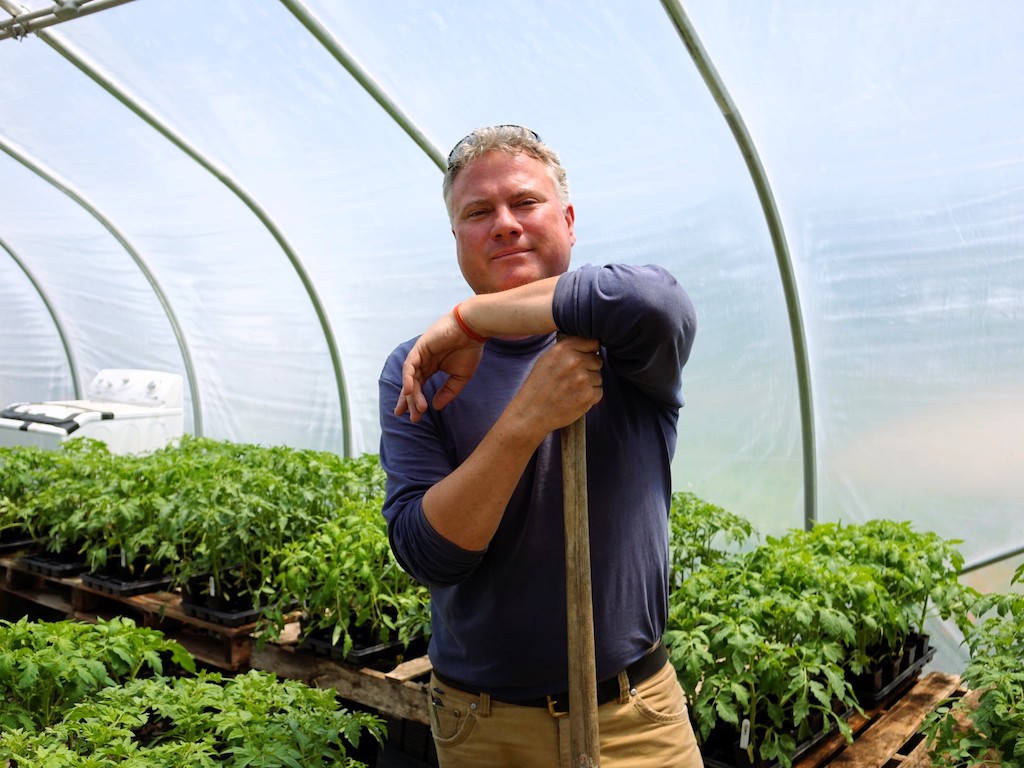
From a bird’s eye view, Rushton Woods Preserve and Farm looked something like this on any Friday afternoon in summer: outside a little red farmshed stands a thoughtful, salt-of-the-earth, middle-aged man, skin darkened by 12-hour days on the farm. Surrounding him are a half dozen CSA members engaged in lively conversation, holding their bags of fresh vegetables. Several people meander about the kitchen garden across from the farmshed, collecting fresh herbs of sage, lavender or oregano.
Beyond that, others move cheerfully about the annual cutting garden, creating colorful flower bouquets to take home as butterflies, bees and goldfinches busily flit about. Children frolic through the flower gardens, along the rows of pick-your-own peas and back to the farmshed to pet Fred’s farm dog who stands by his side.
Panning out beyond the six acres of cultivated farm fields lies a diverse nature sanctuary of hedgerows, unmowed meadows and one of the largest contiguous tracts of forest left in Chester County. Designated as an Important Bird Area, the entire preserve is home to over 80 species of birds, like scarlet tanagers and wood thrush.
Putting the Community in Community Supported Agriculture
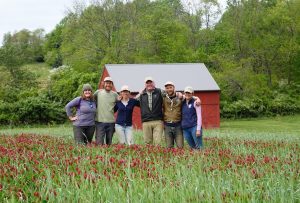
Farmer Fred saw this entire landscape with all its people, birds, insects and plants as a community. He was the fulcrum of this special little world, setting the pulse of the farm to the rhythms of the seasons and lovingly connecting people to these roots through food.
Fred understood that farming has the potential to not only nourish people but also the surrounding ecosystems. When he was hired 18 years ago to create Rushton Farm on the 86-acre nature preserve owned by Willistown Conservation Trust, most of the board of trustees was adamantly opposed. They believed farming occurred at the expense of wildlife. Fred, however, was an organic farmer committed to proving that agriculture can actually serve as the baseline for wildlife conservation.
Today Rushton Farm is not only the heart of the organization but a nationwide model of regenerative agriculture on conserved land.
“One of our first farmers here, Aaron de Long [Fred’s brother], was teaching at University of California, Santa Cruz when he came out to start Rushton Farm with me. He always wanted to look at how agriculture was impacting the surrounding ecosystem, so that’s been a major part of what we grow on these six acres,” said Fred. “So while we grow 140 varieties of fruits and vegetables, we also do it making sure the farm is working in concert with the surrounding ecosystem.”
A Symbiotic Relationship Between Farming and Nature
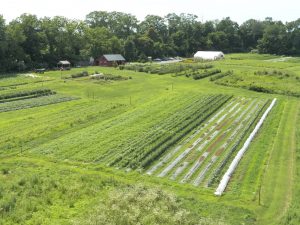
Fred reflected, “What we’ve experienced here in the last 15 years has been a real change in how people approach agriculture. When I started farming 25 years ago, agriculture was seen as ‘produce as much as you can on as much land as you can.’ Now with the idea of regenerative agriculture — protecting the soils and making the land more nutrient-rich — we understand that you can use less land to grow more, and the food is more nutritious. It’s moving away from conventional methods and understanding that the best way to farm is one that works with the land and understands that the health of the land is the most vital part of growing food.”
Regenerative agriculture uses techniques such as cover cropping to keep soils healthy, chemical-free cultivation of non-GMO crops, and unmowed borders of native wildflowers to attract beneficial insects and pollinators. The goal is to enhance natural resources and ecosystem functions while producing food at higher long-term yields. This way of farming includes wildlife conservation, which is becoming increasingly important as we reach the global capacity of arable land.
Today, over 70% of U.S. farmland is chemical-based conventional agriculture, which is destroying ecosystem health and the soil. For example, one handful of healthy soil is supposed to contain more microorganisms than people who have ever lived! By contrast, the soil from conventional farms is virtually devoid of microorganisms. Long-term studies by the Rodale Institute show that healthy soil with high organic matter content is better able to retain water, ultimately leading to 300%–600% higher profits for the bottom line of farmers.
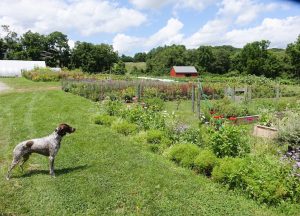
Other research shows the benefits of leaving wild meadow habitat next to cultivated farm fields. One study showed a tenfold decrease in insect pests in regenerative farms over conventional ones, thus decreasing the environmental burden and cost of pesticides.
Fred always loved to illustrate this to the many young students who came through Rushton Farm over the years. Just before his prized tomatoes were ripening on the vine, the beneficial braconid wasps would lay their eggs in the pesky tomato hornworms. Fred enjoyed eliciting gasps of both awe and disgust from the students as he held the parasitized body of the caterpillar in his hand with a hundred tiny white wasp cocoons infesting its green skin. Bio-control at its finest.
Inspiring Young Farmers
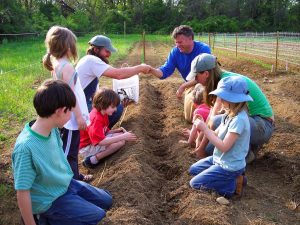
In addition to teaching young people about the interconnections between the farm and nature, Fred was passionate about inspiring young farmers. He dreamed of Chester County moving towards having a large interactive farm community similar to those found in California and New England. Throughout his farming career, he encouraged local and national land trusts to promote the development of community farms on conserved landscapes in order to bridge one of the biggest hurdles for young farmers: finding affordable land. He also changed the course of many young people’s lives who participated in internships at Rushton Farm.
Cooper Schlegel was one such young man. “My summer internship at Rushton was my first real foray into agriculture and part of what got me hooked on the industry I chose to build a career in. After I graduated from Penn State in 2023, I started working for Burpee Seeds in Doylestown, and it’s been a fulfilling career path that was inspired by my time working for Fred. I looked up to him, and he had an influence on me that lasted long after that summer.”
Fred believed food is love. “He loved food: growing it, making it and giving it,” reminisced Noah Gress, Rushton Farm Field Manager. “He was generous with Rushton Farm, giving everyone who worked there a chance to make their experience what they wished, even as it was technically his baby.”
Fred understood that within the beautiful interconnected web of food, wildlife and people, we are all one.
A celebration of Fred de Long’s life will be held Sunday evening, July 20, at Rushton Farm, 911 Delchester Rd., Newtown Square. Donations in his name may be made to the Farmer Fred Memorial Fund at the Willistown Conservation Trust, WCTrust.org/Donate. Funds will be used to sustain Rushton Farm and continue Fred’s legacy of nourishing the community.
*Editor’s note: Fred was a frequent and valued contributor to County Lines Magazine for many years. Read his articles — “Who’s Your Farmer: Promoting Local Food Through Community Supported Agriculture,” “The Best Taste of Summer Jut Got Better with Heirloom Tomatoes” and “Feeding a Community One Garden at a Time” — on our website, CountyLinesMagazine.com.
Our Favorite Resources
- Berk Hathaway Holly Gross
- Berk Hathaway Country Prop
- Chester Cty Community Fdn
- Chester Cty Hosp, Penn Med
- Chester Cty Library System
- Colonial Theatre
- Delaware Museum of Nat & Sci
- Key Financial, Inc.
- King Construction
- Mercedes Benz
- Osher Lifelong Learning
- Ron’s Original
- Tim Vaughan
- West Chester BID
- Walter J. Cook
